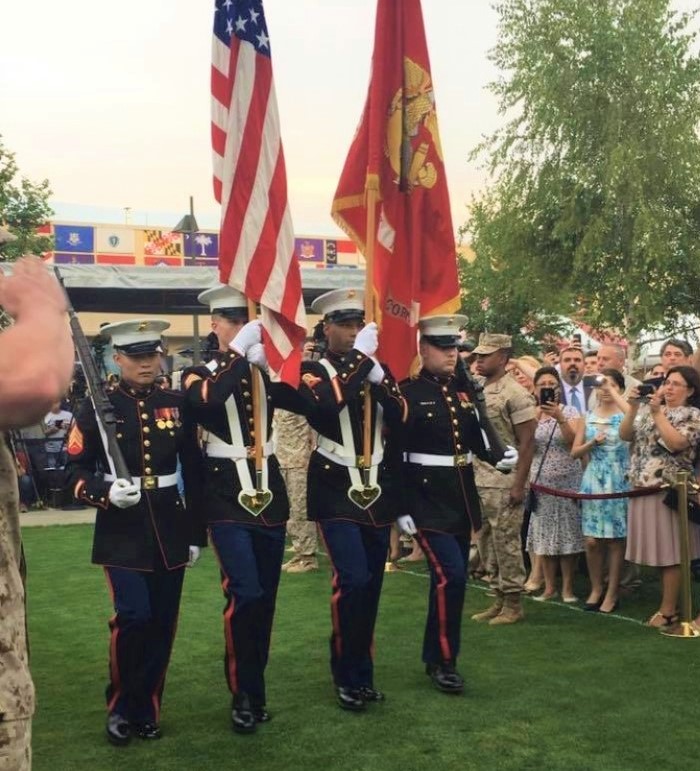Tom Murray is a member of the Monmouth community who highlights the unique experience of a nontypical student. Murray is a military veteran, so his experience is vastly different from most other students at Monmouth. While most first and second year students typically come straight from high school, Murray graduated almost ten years ago. And in that time, he gained worldly and life experience unmatched by most college students. From 2012 until 2017, he served in the United States Marine Corps.
Murray got out of the Marine Corps in August of 2017 after being stationed all over the world, including Lagos, Nigeria, Bucharest, Romania, and Nassau, Bahamas. “I lived in eight places in five and a half years. The longest I was ever in one spot was a year and a half. I had enough of that,” he said.
So, after his enlistment was up, he returned home to New Jersey and worked as a 9-1-1 operator and dispatcher for Wall Township and Ocean Township. He went on to continue his education in the fall of 2018 at Brookdale Community College. In the spring of 2019, he enrolled at Monmouth as a homeland security major.
“Coming back to school was two-fold; I get the benefit of the housing allowance off the G.I. bill for the months that I’m in school, and I get the benefit of the degree once I get all the work done. So, it kind of helps out in two ways,” he said.
While continuing his education is certainly beneficial in the long run, it is far from easy. Murray knows well what it is like to juggle multiple responsibilities at once. Not only is he a fulltime student, he also works two jobs and supports his wife and two-year-old son. He says that this path isn’t exactly what he envisioned he would be doing when he left the Marine Corps. “It wasn’t what I wanted to do, it was what I needed to do so my family didn’t starve,” he said.
Murray attributes his work ethic to his time in spent in the Marines. When he first graduated from high school in 2010, he enrolled for a semester at William Patterson University. But he lacked the drive at the time to thrive in an academic setting. “Just the discipline—as far as, I’ve got to get this done, I’ve got to sit down and do it—I didn’t have that before I went into the military, which is why I failed out the first time,” he said.
But in the Marine Corps, Murray says you have no choice but to be disciplined. The sentiment was, “Show up and do your job. You’re a Marine, you’re supposed to be disciplined. And if you aren’t, we’re going to fix you,” he said.
Today, Murray certainly has the discipline needed to succeed academically. But his exceptional circumstances require him to work even harder for it. He explained that he often has to build relationships with professors that regular students don’t necessarily need to. He explained, “The first class I walk in I’m like, ‘Look, this is what I’ve got going on. I’m a professional fireman, I’ve got a wife, I’ve got a kid. I’ll let you know if I’m not going to be here.’ But it seems that a lot of the professors are more understanding just because I’m not an 18-year-old kid just out of high school trying to get one over on them.”
Along with building relationships with his professors, Murray has also developed connections through the Student Veterans Association, particularly with Coordinator of Veteran Services Michael Callahan. “Mike, with the veteran services, he’s great. You’ve got an issue, you go talk to him, and either he knows where to go or he fixes it right then and there. He knows what’s going on, he’s great with that,” Murray said.
However, Monmouth’s class schedule does make things very challenging for Murray. “If [Monmouth] had more of the one-day-a week classes, if I could take five three-hour classes in one day, and just be done and only have to come here the one day and have the rest of the week to do all the work, it would make things a lot easier and I would have less absences just because there’d be less classes for me to miss,” he said.
Transitioning from Marine to civilian has its challenges. In the military, you take orders. In the real world, you forge your own path. He said, “The transition wasn’t easy. The military is like driving on a highway; you have your lane, you have your responsibilities, you know your rank, you know your place, and you can just cruise. Then you come out of the military, and nobody knows what is going on.”
Additionally, the transition into a setting comprised mostly of people in their late teens and early twenties had its hardships too. Murray, being older than many students and often more disciplined, has found it difficult to connect with traditional students on campus, but the community of other veterans on campus provides some respite for him. “I spend a lot of time in the veteran’s lounge in the student center. If I have an hour break between a class, I go in there. So, I honestly don’t really interact too much with everyday students.”
After he completes his degree, Murray will continue working as a firefighter, which has been a lifelong goal of his. He explained, “I’ve wanted to be a fireman since I was a little kid. Everybody else grew out of it, I didn’t. I got my dream job and I’m glad I did, but for the purposes of promotion and everything I wanted to continue with my degree.” Additionally, his homeland security degree would support other career paths should he choose to retire from the firefighting profession, which he stated he could potentially do as young as age 50.
For now, Murray perseveres so that he can support his wife and child, and eventually be settled enough to be able to spend more time with them. “I’ve got to hustle, I’ve got to move, I’ve got to get this stuff done so ten years from now I’ll only have to work the one job because my salary will be good enough,” he said.
“There’s a straight line to do things and get a college degree, I kind of took a side-step to get there,” he said. Albeit untraditional, Murray’s college experience demonstrates the core value of higher education: the pursuit to better oneself and one’s future. Despite the challenges of being a veteran student while also working two jobs and supporting a family, Murray continues to strive to reach his goals.




